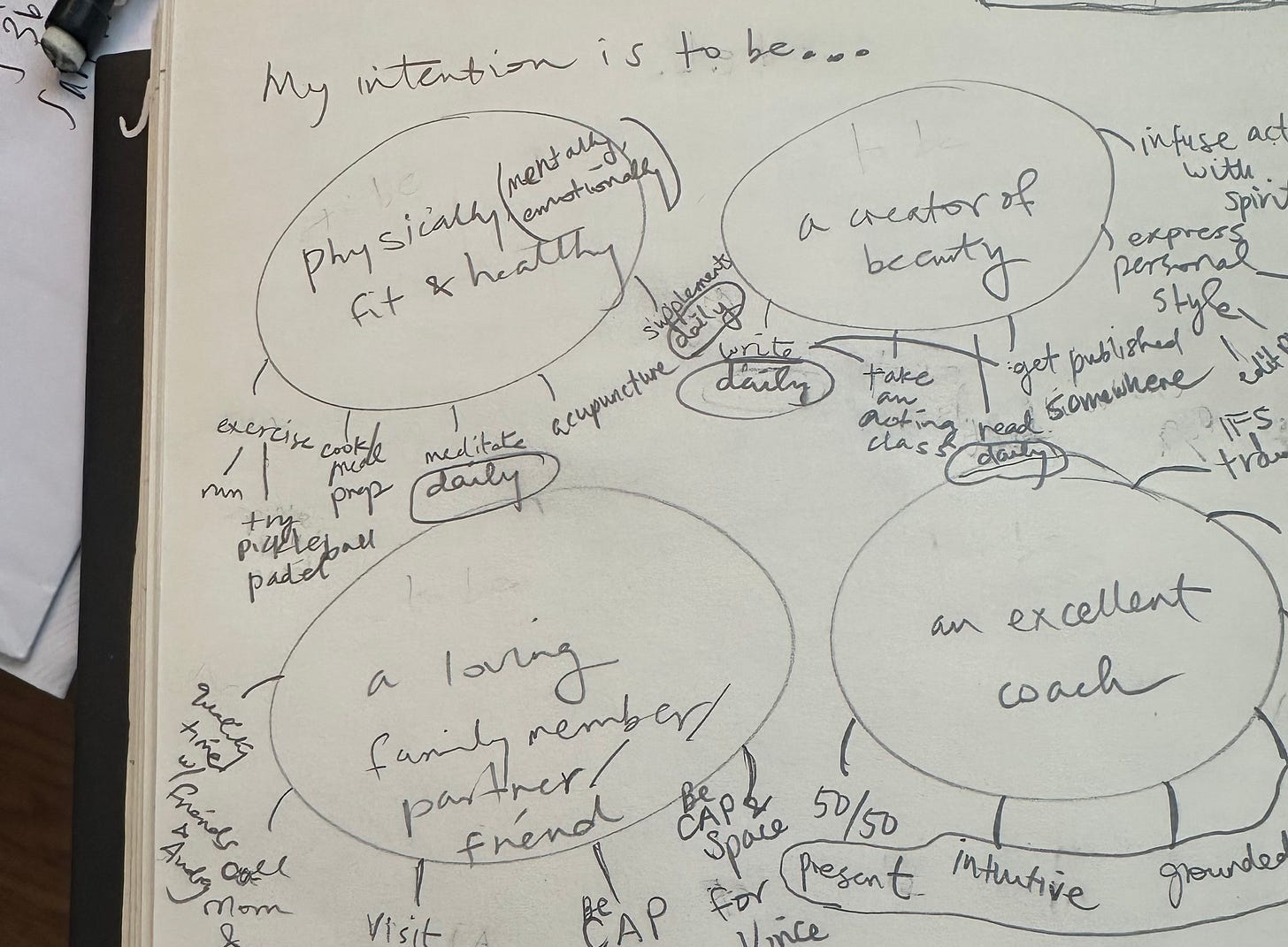The $20 product that’s changing my life
ADHD client story, the award-winning Time Timer, mid-life crisis stuff
“I have time blindness,” she declared.
“There’s this thing called the Time Timer that supposedly helps, so I got one,” she added, dropping the link into our Zoom chat.
Her words hit the screen of my mind, looking like a big pull quote in elegant typeface amidst smaller text. The catchy phrase, the weight of her conviction, that branding choice1. We were in a coaching session, and my brain was actively scanning for things said with energy, oomph.
“What is… time blindness?” I asked.
“It’s an ADHD thing. Means I can’t track how much time has passed or estimate how long things will take. The other day I guessed a task would take 20 minutes but it actually takes 2 hours.” She paused. “Or, two weeks if I’m tied up in knots about it.”
In an effort to remain neutral, I painted the room of my mind a tan, matte eggshell. My Seductive Coined Phrase Alert was popping off.
But she’s being resourceful and awesome and trying something new. Now’s not the time for your cultural anthropological field notes, dude.
“Time blindness” is just as sticky as “impostor syndrome” to me. A large percentage of my clients claim to have the latter when we first start working together. Having had loads of it during grad school and my early years of coaching, my compassion runs deep.
But over the years I’ve noticed something worrisome: internet culture seems to have solidified “impostor syndrome” into a mini-identity. Its popularity as a keyword search on Google has been going up and to the right for years.
It’s comforting to find a name for a challenging experience. If they’ve named it, we’re not alone, right?
On the flip side, I’ve learned that “feeling seen” by a coined phrase can cloak true understanding. The brain can so quickly give it unearned weight, turning it into a label of “This is Who I Am”. And letting something define us leads to more “stuck” than solutions.
“Time blindness”, “impostor syndrome”… both are imperfect attempts to capture a personal, challenging experience. Tidily sums up how you feel, but factually inaccurate because you are not an impostor.2 Nor is anyone truly blind to time.
All to say… I think I might have time blindness.
I knew immediately I had to try this Time Timer thing. For research, for my clients, of course. Plus I was getting kind of desperate.
I’m not 100% unaware of time, no, and neither is that client. Ah, clock-time — what the Greeks call chronos and what we moderns call “struggle with time management”.
Welcome to the party of being creative. My internal monologue won’t shut up, captivating like a movie trailer at best but mostly just supremely annoying. Brain often feels like a trampoline park hosting multiple kids’ birthday parties at once. I can get so absorbed by what I’m doing I cease to breathe and exist, especially when on a screen. Minutes slip and slide by, pile up in the corner. It’s been a source of quiet anxiety for years.
It looks like an ordinary kitchen timer, but don’t be fooled. When you turn the dial, a colored disk appears to fill in the space of time you choose (e.g. 20 mins, 57 mins, etc). As time passes, the shape of the pie slice shrinks at a snail’s pace, until it disappears. Then, a wholly unglamorous, analog beep beep, beep beep.
Are you a bit bored? I was too. Then it started to blow my mind.
IT CREATES TENSION
The way the color and shape of time slowly shrinks is unexpectedly compelling. It reminds me of how mesmerizing it is to look at heavy rain pour, snow softly piling up, or when the wind sculpts sand into a gorgeous rippled beach.
Like a good time-based artwork something is happening, slowly enough for me track it. There is a part of me that keeps wondering how much of the shape is left. What does it look like now?
Boom. Time awareness.
IT PULLS FOCUS
I don’t love my iPhone’s timer. I don’t hate it. Perhaps worse, I nothing it.
It’s a “set it and forget it” user experience. I do other things and check out. I trust that the beep will go off at some point. So, I dedicate 100% of my focus away from the timer. I’ll turn it off and promptly forget to stop or start doing whatever.
Not so with the Time Timer. Since it is a physical object and has a visually-trackable mechanism for measuring time passage, I noticed myself continuing to glance at it.
We live in the attention economy. Many people get paid large amounts of money to continuously pull our focus onto an app, ad, whatever. But the Time Timer pulls focus quietly, for the good of me. And my nervous system stays regulated. What a concept.
IT INJECTS PLAY INTO THE MUNDANE
Everything feels slightly higher stakes, in a fun way. I’ve been timing myself doing the most ordinary things that before, I just “did”.
10 mins to do my makeup (and…go!)
12 mins to pack up before I have to catch the bus (and…leave!)
5 mins AND 5 MINS ONLY to respond to this text (and…stop overthinking it and send, don’t lose the thread for a week)
14 mins to low-and-slow bake this lemon herbed butter salmon at 375 degrees (and…done!)
Since using the Time Timer, I’ve arrived places on time, early even, and had some fun doing it. Wtf.
IT SOMEWHAT SOOTHED MY EXISTENTIAL CRISIS
The Time Timer is but a tool. Without the power of clear intention behind it, it’s likely to sit and collect dust just like any other object.
As I enter mid-life, I keep thinking about the limited number of phone calls and hangs I have left with the people I love. The things I want to try or create before I die.
You can say I found the Time Timer at the right time; I’m working this thing like my life depends on it. Because it does.
After a week of use, some soft magic started to glow amidst all the timing of daily tasks. After a month, my appalling backlog of todos has been cut in half. There is more space in my body, brain, life.
It wasn’t long until I asked myself, “What’s important to me that I don’t spend enough time on?”
Using an oldie-but-goodie coaching exercise I do with clients, I sketched out who I want to be and some habits/actions that amount to that sort of person.
There it was — how I really want to spend my precious time.
Small, unassuming things — a schedule, a timer, a plant care card, a bone flute — can be portals to the profound.
When I turn the dial on the Time Timer, I am opting to spend time with clear intention. I choose my choice.
Haven’t felt this empowered over my time in ages. Since about 2020, what I have felt is literally offbeat. It’s out there, you’ve felt and read it: the lockdown and the pandemic changed a lot of people’s sense of time, to varying degrees of staying power.
“How we spend our days is, of course, how we spend our lives. What we do with this hour, and that one, is what we are doing. A schedule defends from chaos and whim.” — Annie Dillard
Dear Time Timer, effective little defender from chaos and whim. My creativity thanks you dearly.
Thank you to my clients navigating (and thriving with!) an ADD/ADHD diagnosis who told me about time blindness and the Time Timer. I feel grateful for
, , Yelena Olin, and for encouragement and golden feedback. Thanks for patiently putting up with offbeat me :)The credited images in Quiet Confetti by Kat Koh were made by humans who got paid for their work.
Seriously, it’s called the Time Timer. Lazy? Brilliant? Both?
You are always you. You can’t pretend to be you. There is only one of you that has ever and will ever exist. Also, feeling like an impostor is definitely not a medical syndrome.








As someone who is very visual, this is super appealing. Adding it to my wishlist. ⏳⏳⏳The moment you mentioned forgetting to eat, breath, drink: this.
I kept reading 'Time Timer' as 'Time Turner' - but this is a great explaination of time blindness (something I learned in December) and how to beat it.
Timers are the ultimate hack, especially as a game with ourselves